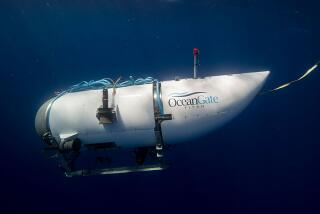Official Plans Public Inquiry Into Pan Am Bombing : Scotland: His action would be similar to a coroner’s inquest. It falls short of the full-scale probe demanded by victims’ relatives.
- Share via
EDINBURGH, Scotland — Scotland’s top law enforcement official said Friday that he intends to order a public inquiry into last December’s terrorist bombing of a Pan American World Airways jetliner over Lockerbie, killing all 259 persons on board and 11 others on the ground.
The level of the investigation, comparable to a coroner’s inquest in the United States and known formally as a Fatal Accident Inquiry, falls short of the full-scale public inquiry demanded by relatives of the victims, 188 of whom were Americans.
But the Lord Advocate, Peter Fraser, told reporters: “It is the only form of inquiry that I am entitled as a law officer to instruct. There is no other option open to me.”
The British government, which could order a more comprehensive investigation, has refused to do so on grounds that it might prejudice the criminal investigation still in progress to determine the identity of the persons responsible for destroying the plane, Pan Am Flight 103, last Dec. 21.
Fraser said this investigation has made “encouraging progress,” although it is not yet at the stage where prosecutions are “immediately in prospect.”
A Fatal Accident Inquiry is presided over by a sheriff who can subpoena witnesses and evidence only from within the United Kingdom. The Pan Am 103 criminal investigation has already involved inquiries in 52 countries.
But a Fatal Accident Inquiry would have limited powers to look into the controversial question of whether the bombing might have been avoided by better security procedures. And its proceedings would be public.
Fraser said that criminal prosecutions are still his primary goal but that because of the high level of public concern over the incident and the complexity of the arrangements necessary for a public inquiry, “It seems to me that this is the appropriate time . . . to set the wheels in motion.”
He said that although he “cannot at this stage fix the date in 1990 when this inquiry will be held, it is, nevertheless, my intention early in the new year to determine what preliminary preparations should be set in hand for the Fatal Accident Inquiry without diverting any effort from the criminal investigation.”
He said that “if the criminal investigation progresses very satisfactorily to the point of criminal prosecution, then it might be necessary to defer (the inquiry) or put it off altogether.” He emphasized that his announcement of the inquiry “should not be taken as an indication . . . that I am pessimistic” about prospects for a criminal prosecution.
Fraser and Chief Constable George Esson confirmed officially for the first time that they have made “significant progress” in identifying pieces of clothing from the suitcase that contained the bomb. They also confirmed that Mohammed abu Talb, a Palestinian being held in Sweden, is one of several individuals who are now at the focus of the criminal investigation.
“While I’m not trying to minimize that he is of interest to us, there are many others in the same category,” Esson said. He confirmed that tests are being made on clothing found in a search of Abu Talb’s residence in Sweden to compare it with fragments known to have been in the suitcase that contained the bomb.
Fraser interjected: “I think it is important to distinguish that what has taken place in Sweden thus far is part of the investigative process, and it is not part of the prosecutorial process. Accordingly, I would make it quite clear that I have at present no intention to seek the extradition of Abu Talb.”
Esson also confirmed that investigators are particularly interested in the Popular Front for the Liberation of Palestine-General Command, an extremist Palestinian group headed by a former Syrian army officer, Ahmed Jibril. But he said it “would be unwise to rule out other possibilities.”
Abu Talb is not known to be a member of Jibril’s group, but he is said to have a relative who is a member.
Intelligence sources have speculated that Jibril’s group carried out the Pan Am bombing on behalf of Iranian officials intent on revenge for the downing in June, 1988, of an Iranian airliner by the U.S. cruiser Vincennes.
Investigators had confirmed previously that the bomb, made of plastic explosives, was concealed in a Toshiba radio-cassette player and placed in a suitcase that was put in the plane’s forward cargo hold. Esson repeated Friday that Scottish police believe the suitcase either started at “or passed through the Frankfurt airport.”
Flight 103 originated in Frankfurt, West Germany, and switched planes in London before heading for New York. It was blown up 31,000 feet over the Scottish countryside. West German police say there is no proof that the bomb was put on board in Frankfurt.
Esson said the international investigation has cost the equivalent of nearly $12.5 million so far. He said that more than 14,000 statements have been taken in the wide-ranging investigation.
“What we are doing in effect is trying to piece together an international terrorist jigsaw,” he said. “We have some of the pieces. Some we are trying to place, and some we have yet to find.”
More to Read
Sign up for Essential California
The most important California stories and recommendations in your inbox every morning.
You may occasionally receive promotional content from the Los Angeles Times.













